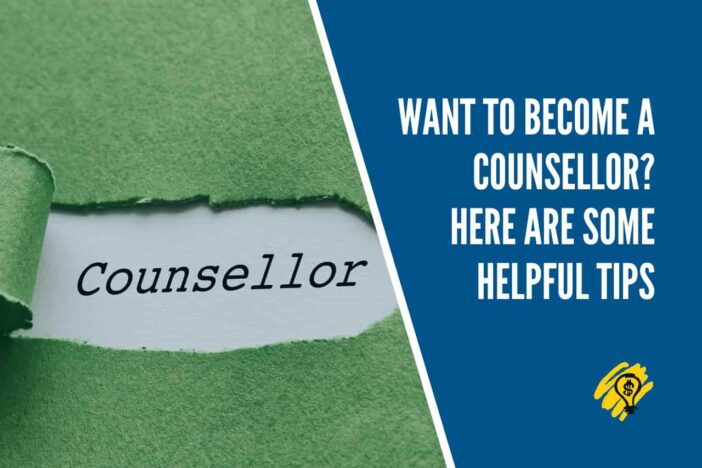If you’re thinking about becoming a counsellor, then you’re probably already aware of the importance of emotional support in people’s lives. Counsellors provide a vital service to society, helping people to work through their problems and providing them with the tools they need to improve their lives.
Becoming a counsellor is not an easy task, but it is one that is immensely rewarding. If you’re dedicated to helping others and have the necessary skills, then counselling could be the perfect career for you. Here are some tips to help you on your way to becoming a counsellor:
Get the right qualifications
If you want to become a counsellor, it is important that you get the right qualifications. There are many different counselling courses available, so it is important to choose one that is right for you.
Some counselling courses can be completed online, while others may require you to attend classes in person. It is important to choose a course that fits your lifestyle and schedule.
Once you have completed a counselling course, you will need to obtain a licence from the British Association for Counselling and Psychotherapy (BACP) or from the PACFA (Psychotherapy and Counselling Federation of Australia) and the ACA (Australian Counselling Association) if you are from Australia. The former will allow you to practise as a counsellor in the UK, and the latter in Australia. You can also choose to pursue post-graduate education in counselling by taking a Master of Counselling course, which has online and campus-based course options. Obtaining a master’s degree in this field will open broader career horizons and improve your chance of getting a promotion.
You need to have good communication skills
If you want to become a counsellor, good communication skills are essential. You will need to be able to communicate effectively with your clients, understand their needs and feelings, and provide them with the support they need. Your communication skills should also extend to communicating with other professionals, such as doctors, therapists, and social workers. As a counsellor, you will often be required to liaise with other professionals in order to provide the best possible care for your clients.
You need to be a good listener
You will also need to be a good listener. This is probably the most important quality you need to have if you want to become a counsellor. Active listening skills are essential in counselling, as you need to be able to really listen to what your clients are saying, and understand their feelings and experiences. This can be challenging at times, but it’s important to remember that your clients are trusting you with their innermost thoughts and emotions. Show them that you care, and that you’re there to help them work through whatever they’re going through. People who come to see a counsellor are usually looking for someone to talk to, and they need to feel like they are being heard. If you can’t be a good listener, then counselling is probably not the right career for you.
You need to have empathy
If you want to become a counsellor, one of the most important qualities you need to possess is empathy. Empathy is the ability to understand and share the feelings of another person. It’s essential for counsellors, as it allows them to build rapport with their clients and truly understand their experiences. Without empathy, it would be difficult to provide effective counselling.
So, if you’re interested in becoming a counsellor, make sure you work on developing your empathy skills. There are many ways to do this, such as taking an online course or reading books on the topic. With some effort, you can develop this important quality and help others in the process.
Make sure you understand the basics of human psychology
As a counsellor, it is important to have a strong understanding of human psychology. The better you understand how the mind works, the better equipped you will be to help your clients. There are many different theories out there, so make sure you do your research and find one that resonates with you. This will allow you to better understand your clients’ needs and feelings, and provide them with the support they require.
You don’t need to have a degree in psychology, but it is important to have at least a basic understanding of the subject. There are many books and online resources available that can help you gain a better understanding of human psychology. In addition to studying psychology, it can also be helpful to read up on other related topics such as sociology, anthropology, and even biology. The more you know about human behaviour, the better equipped you will be to deal with the challenges your clients may be facing.
Understand your own limitations
It is important to remember that as a counsellor, you are not expected to have all the answers. In fact, it is often more helpful to admit when you don’t know something, as this shows your clients that you are human too.
Instead of trying to act like you know everything, focus on being a good listener and providing a safe space for your clients to share their thoughts and feelings. If you don’t have the answer to a particular question, be honest about it and offer to help find the resources they need.
You need to be patient
If you want to become a counsellor, one of the most important qualities that you need to possess is patience. This is because becoming a successful counsellor requires being able to listen attentively to what clients have to say without rushing to judgement or offering solutions too quickly. Instead, it’s important to be able to give clients the time and space they need to express themselves fully, in order that they can gain clarity on their own situation and work out the best way forward for themselves.
Being patient also means being comfortable with pauses in conversation – sometimes the silences can be just as important as the words spoken in counselling sessions. So if you’re someone who feels the need to fill every silence, then counselling may not be the right career for you.
Get some experience
While qualifications are important, they’re not everything. It’s also important to get some experience working with people before you start your career as a counsellor. This can be done in many ways, such as volunteering for organisations that provide support to people in need or working as a support worker in a mental health setting. Getting some experience will help you to understand the challenges and rewards of counselling and will give you an insight into what the job entails.
Find the right environment
When you’re ready to start working as a counsellor, it’s important to find an environment that is right for you. There are many different types of counselling jobs available, so take some time to consider what would suit you best. If you’re interested in working with children or families, then there are plenty of roles in schools and social services. If you’re more interested in working with adults, then there are roles available in GP surgeries, mental health clinics, and other settings. Once you’ve found the right environment, you can start your career as a counsellor and make a difference in people’s lives.
Becoming a counsellor is a rewarding but challenging process. If you’re dedicated to helping others and have the necessary qualifications, skills, and qualities, then counselling could be the perfect career for you. By following these tips, you’ll be on your way to becoming a successful counsellor.





